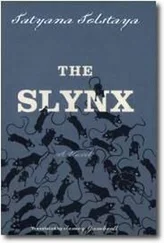Aunt Rita, where are you? In what spaces does your weightless spirit wander, is peace known to you? Do you sweep like a wan breeze across the meadows of the dead, where hollyhocks and asphodels grow, do you howl like a winter storm, pushing your way through the cracks of warm human dwellings, is it you singing in the sounds of the piano, living and dying with the music? Maybe you whimper like a homeless dog, run across the night road like a hurrying hedgehog, curl up under a damp stone like an eyeless worm? You must be in a bad way wherever you are now, otherwise why infiltrate our dreams, reach out your hand, ask for alms—bread, or, perhaps, simply memory? And who are these people you’ve taken up with, you, so pretty, with your fair hair and colored sash? Or are the roads that all of you take so dangerous, the forests where you spend the night so cold and deserted, that you band together, press close to one another, and hold hands as you fly over our lighted houses at night?…
Can it really be that this is what lies in store for me as well: to wander, whimper, pound on doors—remember, remember!… The predawn clatter of hooves on cobblestone, the dull thud of an apple in an orchard gone to seed, the splash of a wave in the autumn sea—someone is beseeching, scratching, someone wants to return, but the gates are closed, the locks have rusted, the key has been thrown away, the caretaker has died, and no one has come back.
No one, do you hear, no one has come back! Do you hear? I’m going to scream!!! Aaaaaaaa! No one! No one! And we are all pulled that way, an invincible force pushes at our backs, our legs slip on the crumbling incline, our hands clutch at clumps of grass, at least give me time to collect myself, to catch my breath. What will remain of us? What will remain of us? Don’t touch me! Lora! Lora! For heaven’s sake, Lora!!!
…And she arose from the dark, from the damp fog, arose and moved toward him, unhurried—clip-clop, slip-slop—in some sort of outrageous, slit-open gold boots, in brazen, wantonly short boots; her thin, orphaned ankles creaked, wobbling in the gold leather, higher up a flamboyant raincoat furled and rustled in the black beads of the night fog, buckles clinked and clanked, higher still her smile played, the lunar rainbows of streetlamps set her rosy teeth ablaze; above the smile hung her heavy eyes, and all this rustling, all this effrontery and finery, triumph and abomination, the entire living, swirling maelstrom was topped off with a tragic man’s hat. Lord almighty, Father in heaven, it was with her that he would share his bed, his table, and his dreams. What dreams? It doesn’t matter. All sorts. A beautiful woman, a garrulous woman, a head full of rubbish, but a beautiful woman.
“Well, hello there, Denisov, I haven’t seen you in ages.”
“What are those puttees you’re wearing, my lovely?” Denisov asked disapprovingly as Lora kissed him.
She was surprised and looked down at her boots, at their dead, gold cuffs, rolled inside out like the pale flesh of poisonous mushrooms. What’s that supposed to mean? What’s with him? She’d been wearing them for a whole year already, had he forgotten? Of course, it was definitely time to buy new ones, but she wasn’t up to it at the moment, because while he had been off keeping himself in seclusion, she’d had a horrific misfortune. She got out to the theater only once in a blue moon, and she wanted to take a little break from Papa and live like a human being, so she sent Papa to the country and asked Zoya Trofimovna to keep an eye on him. Zoya Trofimovna couldn’t stand it more than three days—well, no one could, but that’s beside the point—so anyway, while she was cooling out in one of those basement theaters—a very fashionable little theater and very hard to get tickets to—where the whole decor is only matting and thumbtacks, where the ceiling drips, but there’s a lofty spirit, where there’s always a draft on your legs, but as soon as you enter you have this instant catharsis, there’s so much enthusiasm and the tears are so divine that you want to burst. So anyway, while she was hanging out there and lapping it all up, hoodlums cleaned out their apartment. They took everything, literally everything: candlesticks, brassieres, an entire subscription set of Molière, a poisonous pink Filimonovsky clay toy in the shape of a man with a book—it was a gift from one of those village writers, a born genius, they won’t publish him, but he came on foot from the backwoods, he spends the night with kind people and he doesn’t bathe on principle; on principle, because he knows the Fundamental Truth and hates tile with a fierce hatred, he simply turns purple if he sees glazed or brick tile somewhere, he even has a cycle of anti-tile poems—powerful lines with the strength of timber, all full of “Hail!” this and “Hail!” that, and about magical singing zithers, something really profound—so anyway, his present disappeared and so did that Vietnamese bamboo curtain, and whatever they couldn’t carry off they either moved somewhere else or piled up. What kind of people are these, tell me, I just don’t know; naturally, she had reported it to the police, but of course nothing would come of it, because they have such awful bulletin boards there—missing children, women they haven’t been able to find for years—so how could they be expected to rush out and comb Moscow for a bunch of brassieres? It was good that they didn’t throw out Papa’s manuscripts, only scattered them. Anyway, she was terribly depressed about all this, and she was also depressed because she went to a reunion of her former classmates—they graduated from school fifteen years ago—and everyone had changed so much that you simply couldn’t recognize them, it was a nightmare, total strangers.
But that’s not the main thing, the main thing is that there were these guys, Makov and Sysoev, they used to sit at a desk in the back row and shoot spitballs, they brought sparrows to school, and on the whole were thick as thieves. So anyway, Makov died in the mountains—and remained there—that was four years ago, and no one knew, just think, a real hero, nothing less, while Sysoev had become fat and happy—he arrived in a black car with a chauffeur and ordered the chauffeur to wait, and the fellow actually slept in the car the whole evening, but when the guys found out that Sysoev was so important and such a big shot, and that Makov was lying somewhere in a crevice under the snow and couldn’t come, and that swine Sysoev was too lazy to walk over on his own two feet and rolled up in an official car just to show off—there was a scuffle and a rumble, and instead of warm embraces and beautiful memories they boycotted Sysoev, as if there were nothing else to talk about! As if it were his fault that Makov had climbed those mountains. And everyone became simply beastly, it was all so sad, and one boy—of course, he’s completely bald now, Kolya Pishchalsky— picked all the crabs out of the salad and threw them right in Sysoev’s face and shouted: Go on, eat them, you’re used to it, but we’re just simple people. And everyone thought that Sysoev would kill him for it, but no, he got terribly embarrassed and tried to be friendly, but everyone gave him the cold shoulder, and he walked around completely flustered, offering antifog headlights to anyone who wanted to buy them. And then he sort of slipped out, and the girls began to feel sorry for him and started screaming at the others: You aren’t human! What did he do to you? So everybody left hostile and angry, and nothing came of the evening. So there you have it, Denisov, why are you being so quiet, I’ve missed you. Let’s go to my place, it’s completely ransacked, but I’ve managed to make everything more or less presentable.
Lora’s gold boots squeaked, her raincoat rustled, her eyes shone from beneath the hat, her eyebrows smelled of roses and rain… while at home, in the stale smoky room, under the wet ceiling, squeezed between dislocated layers of time, Aunt Rita and her comrades thrash about; she perished, the sash tore, the perfume spilled, and the fair hair rotted; she didn’t accomplish anything during her short life, only sang in front of the mirror, and now, lifeless, old, hungry, and frightened, she rushes about in the realm of dreams, begging: remember me!… Denisov tightened his grip on Lora’s elbow and turned toward her house, driving away the fog: they shouldn’t split up, they should remain together always, united inside one pair of equation brackets, inseparable, indivisible, indissoluble, merged, like Tristan and Isolde, Khor and Kalinych, cigarettes and matches.
Читать дальше












